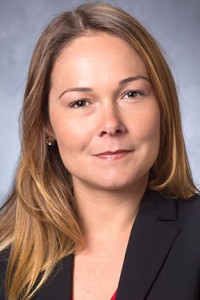Confucius said: It is such a delight to have friends from afar
By Kathleen Doty
October 16, 2016
. . . and so began our first day in China, with a warm welcome from Professor Yang Li, Vice-President of Shanghai International Studies University (SISU). He shared his hope that through our exchange, “the distance between American and Chinese businesses will be bridged.” These sentiments were echoed by Kimberly Griffin, Deputy Director of the Confucius Institute at Georgia State University, and Paulina Guzman, Membership Manager at the World Affairs Council of Atlanta.
Our opening ceremony took place in the state of the art conference facilities at SISU, one of the top universities in China for students of translation and interpretation. We all felt quite official with headphones, tablets at each of our seats, and interpretation provided by Dean Zhang Ailing. The ceremony closed with our hosts presenting us with a lovely gift of custom-made SISU jackets.
We were then treated to a lecture by Dr. Zhang Shangwu, Professor and Deputy Dean of the College of Architecture and Urban Planning from Tonghi University. He introduced us to the historical expansion of the city of Shanghai, and its newly unveiled 2040 development plan. While historically, Shanghai has always been an important city in the region because of its rich water resources of the Yangtze river delta, following the 1840 Opium wars, the city started to take shape as an international center of commerce because of the concessions granted to various foreign governments in the aftermath of the war. Official urban planning began in the 1920s and 1930s, but intervening conflicts and political changes meant that many of these projects were never completed.
It wasn’t until the 1990s that the Shanghai Master Plan was adopted as the blueprint of development for the city. This was a critical because it emphasized the four major areas of industry that would define the city going forward: economy, finance, trade, and shipping. It also aimed to control the incredibly densely populated city, at that time, 9 million people in less than 700 square kilometers, by moving approximately 80,000 people to satellite cities, built to absorb them. This Plan was bolstered by China’s ascension to the World Trade Organization in 2001, and showcased when Shanghai hosted the 2010 World Expo that focused on urban life. The latter also drove a new wave of infrastructure development, including a deep water port, two international airports, and a vastly improved metro system.
The economic crash forced Shanghai to revision its future as the manufacturing industries and accompanying trade suffered. The city faces many challenges, including a steady population growth rate and a dwindling supply of land as urban sprawl expands. Accordingly, the 2040 plan aims to re-position the city by adding three new areas of focus to those emphasized by the 2010 plan: innovation, especially in the areas of the tech and service industries; culture, to make the city more attractive to newcomers and livable for current residents; and environment, to include increased outdoor spaces and sustainable growth mechanism. The overall goal is to create a better city that offers a better life.
From what we’ve seen so far, Shanghai is indeed an incredibly organized city for a place so densely populated. I look forward to exploring more and seeing this development plan in action.
Stay tuned for more! The Lujiazui Financial District/Shanghai Urban Planning Exhibition is up next!
 Kathleen Doty is the Director of Global Practice Preparation at the Dean Rusk International Law Center at the University of Georgia School of Law. She holds a BA from Smith College and a JD from the University of California-Davis School of Law. She is currently an MA candidate in political science and international affairs at the University of Georgia.
Kathleen Doty is the Director of Global Practice Preparation at the Dean Rusk International Law Center at the University of Georgia School of Law. She holds a BA from Smith College and a JD from the University of California-Davis School of Law. She is currently an MA candidate in political science and international affairs at the University of Georgia.
Before joining the Center staff in 2015, Doty practiced treaty law in Washington, D.C., as assistant counsel for arms control and international law at the Office of the General Counsel, Strategic Systems Programs, U.S. Department of the Navy. Before that, she was attorney-editor at the D.C.-based American Society of International Law (ASIL), and she currently chairs ASIL’s Non-Proliferation, Arms Control, and Disarmament Interest Group. Her writing has been published in International Legal Materials, the UC Davis Journal of International Law & Policy, the Tulane Journal of Law & Sexuality, and online at Jurist and IntLawGrrls.
Twitter: @kathleenadoty
YLFPChina Web
http://international.gsu.edu/ylfpchina
Homma Rafi | YLFPChina Media Contact
Office of International Initiatives, Georgia State University
hrafi1@gsu.edu
Paulina Guzman | YLFPChina Co-Director
World Affairs Council of Atlanta
pguzman1@gsu.edu
Kimberly Griffin | YLFPChina Co-Director
Confucius Institute, Georgia State University
kgriffin25@gsu.edu













